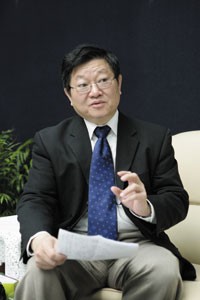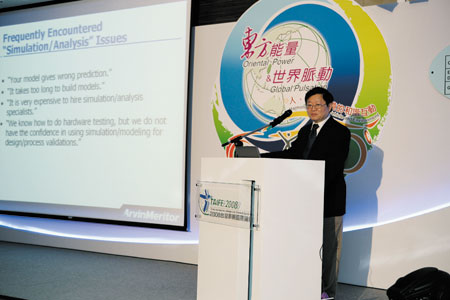Interview With Dr. Shih Shan, ArvinMeritor's Senior Director
2008/08/25 | By Steve ChuangTaiwan's mature auto parts industry has gradually made itself felt in the global market. One manifestation of this growing reach is the decision by ArvinMeritor Inc., one of the world's top 100 suppliers of auto and heavy-duty-vehicle parts on an OEM (original equipment manufacturing) basis, to seek cooperation with more local manufacturers.
ArvinMertior may not be very familiar to parts makers in Taiwan, or even elsewhere in the region, as the U.S.-based supplier did not pay much attention to the Asia-Pacific market in the past. At the present time the company derives only about 7% of its revenue Asia; but now, with the emergence of the Chinese car market and the recent recession in the European and North American car markets, things are changing.
In recent years ArvinMeritor has started putting heavy emphasis on deployment in the Asia-Pacific market for auto parts, and has worked with quite a few automakers and auto parts suppliers in China to build a solid foothold there. Early this year it set up a joint venture with China's leading car brand, Chery.
ArvinMeritor has sent high-ranking managers to source auto parts from Taiwanese makers at the Taipei International Auto Parts & Accessories Show (Taipei AMPA) for two years in a row. This year, the firm dispatched a procurement manager and a director of its China Technical Center, Dr. Shih Shan, to buy suspension parts and auto electronics at the show.
In an exclusive interview with CENS (China Economic News Service), Dr. Shih talked about his company, its plans to tap the Asia-Pacific market for auto parts in next few years, and his optimism about the possibility of Taiwanese makers joining his company's supply chains in the future.

ArvinMeritor, with a history of nearly a century and combined revenues of US$7 billion a year, currently operates 62 manufacturing facilities, 30 technical centers, and nine warehouses, and employs more than 18,000 workers in 23 different countries. The firm has two major business divisions--Light Vehicles and Commercial Vehicles--with the former contributing 33% of total revenues and the latter 67%. Together they supply a wide range of auto parts, including roofs, doors, electric motors, chassis system parts, suspension parts, brake parts, steering parts, drive axles, drivelines, hybrid drives, and wheels.
Dr. Shih, who has spent many decades with ArvinMeritor, said that the company is an extremely experienced auto parts maker with a well-rounded business management system and organizational culture. "Under ArvinMeritor's systematic management," he commented, "every daily affair in the organization is progressing in complete compliance with existing regulations and rules, in which no sloppy work is allowed to happen. I would say it (ArvinMeritor's systematic management) works just like a traffic light which all workers obey precisely. I found that most Chinese companies are more flexible in their management; but this may be not be good for them if they want cooperation with foreign investors."
In its production operations, ArvinMeritor has adopted a "lean production system," an efficient production management method originally initiated by Japan's Toyota which automakers can use to reduce waste and unnecessary work with the ultimate goal of creating added value for their customers.
According to Shih, ArvinMeritor keeps the fewest workers possible so as to control labor costs-in North America, a crucial factor. The company tends to build its factories in remote areas far away from urban downtowns, where land is cheaper.
Also, under the lean production system, ArvinMeritor encourages its workers to offer their opinions about their work and any problems they face in production and management every day before starting to work. "They are educated to make the company better," Shih commented. "The effort to improve continuously has helped ArvinMeritor exist for nearly a century amidst intensifying competition in the global market for auto parts. We're now planning to introduce this system into China."
Shih also mentioned that electric cars and hybrid vehicles are undoubtedly gaining popularity in America and Europe as concerns about ecological protection intensify all over the world. He added that ArvinMerritor has moved to develop new parts, including hybrid motor controls and chassis system parts, for such cars as well as electric trucks and heavy-duty vehicles.
CAE (computer aided engineering), which is Shih's particular field, has facilitated the company's progress in developing such parts. CAE makes engineering analysis more efficient and more feasible than ever before, Shih noted.
CAE enables analytical engineering and manufacturing companies to vastly improve productivity and bring their new products to market faster and cheaper. For example, complicated optimization studies, using computational fluid and solid mechanics techniques, help to improve product design integrity before costly investments are made in downstream operations.
Shih noted that with its more than 25 years of effort in applying CAE to optimization engineering, ArvinMeritor can effectively reduce the cost of developing new parts and enhance their added value in terms of performance and fuel economy. "However," he cautioned, "the success of CAE depends on groups, not individuals. Every worker must be consistently engaged in this task, and should learn importance of controlling costs."

Suffering declining sales in the European and American markets, ArvinMeritor recently kicked off deployment in the Asia-Pacific market and has already allied with quite a few Chinese automakers.
Shih confessed that compared with other leading companies in the auto industry, his firm is a bit late in penetrating China's auto market. "In the past," he explained, "we exported only low-end exhaust system parts to the Asia-Pacific market and didn't pay it much attention. As a result, that market generates only 7% of our revenues." ArvinMeritor is cooperating vigorously with leading Asia-Pacific automakers in a bid to boost that ratio to 33%, starting with the production of sunroofs, locks, and car doors. It now plans to set up production lines for advanced parts in Wuhu, in the central Chinese province of Anhui.
"In the initial stage of our development plan," Shih reported, "we have tried to build close ties with Chinese makers so as to quickly alleviate objections about localization. And then we are going to introduce the production of high-end parts and products for use in either heavy-duty vehicles or light vehicles in the local Chinese market-they are in our field. In the future, we will spend a total of US$4 billion per year on the sourcing of auto parts from the Asia-Pacific market. That is more than half of our total annual revenues of US$7 billion."
As the most important element in its China deployment plan, ArvinMeritor has set up a joint venture, ArvinMeritor Chassis Systems Wuhu Co., together with China's Chery Automobile. The new joint venture is scheduled to go operational in 2008, turning out chassis system parts with a value that will reach approximately US$150 million in 2010.
"In fact we're still learning how to operate in China," Shih commented, "and, above all, we're trying to build up our own resources there because we're still sending finished parts made in China back to testing labs that we trust in North America. This is costly, so we're quite eager to seek our resources in China."
Count Taiwan In
At the same time, though, Shih is heavily promoting Taiwan and convincing ArvinMeritor's top management to outsource more auto parts to the island. "I must say," he conceded, "that ArvinMeritor had almost no idea about Taiwan before. This situation might be a result of insufficient promotion of Taiwan-made auto parts; however, it can be improved by collective efforts such as Taipei AMPA."
After sending ranking managers to Taipei AMPA two years in a row, ArvinMeritor is impressed by the excellent production and credibility of Taiwanese auto parts makers. "I'm optimistic that Taiwanese makers will be able to join ArvinMeritor's supply chains, as they are good at the production and development of high-end, advanced auto parts," Shih said enthusiastically. "If we want to make big progress in exploring the Asia-Pacific market, we can't neglect Taiwan's strong influence in the sector. There is no doubt that ArvinMeritor and Taiwan will rely heavily on each others in the future."
Asked about how Taiwanese makers can become suppliers to ArvinMeritor, Shih answered, "In addition to common standards like ISO, Taiwanese makers must also pass a series of strict supplier certifications in production and management for both ArvinMeritor and, in particular, our downstream customers. This, I think, is not difficult for them." Five or six Taiwanese auto parts makers are already on ArvinMeritor's supplier list, including the Hota Industrial Mfg. Co. (supplying gears) and Kai Fa Industry Co. (front bumpers).
Talking about the future of Taiwan's auto parts sector, Shih suggested that the island should put more emphasis on the development of high-end auto parts so as to avoid the pitfall of rock-bottom prices. He also pointed to Taiwan's superior competitiveness in terms of auto parts know-how, saying "I suggest that Taiwan should try to concentrate on the development of IT (information technology) and CAE so as to provide technical support for the world's car industry."
"Taiwan should also work on quality and standards testing. I think the government-funded ARTC (Automotive Research & Testing Center) is living proof that countries in the Asia-Pacific area can do the job as well as America and Europe. If Taiwan becomes Asia's testing center for auto parts, the island will be more influential in the world and will easily be able to create more win-win opportunities with more leading international companies." (April 2008)




